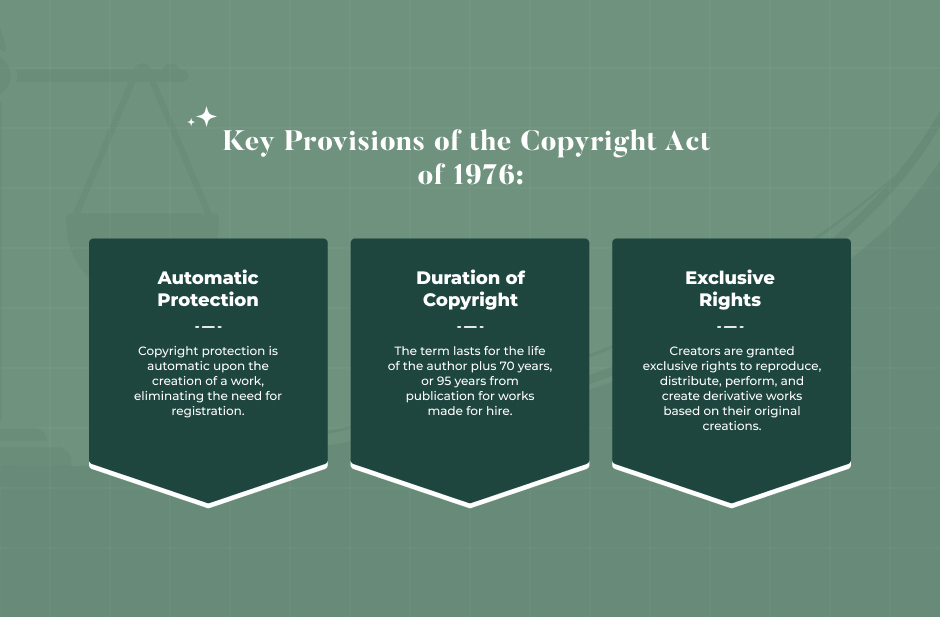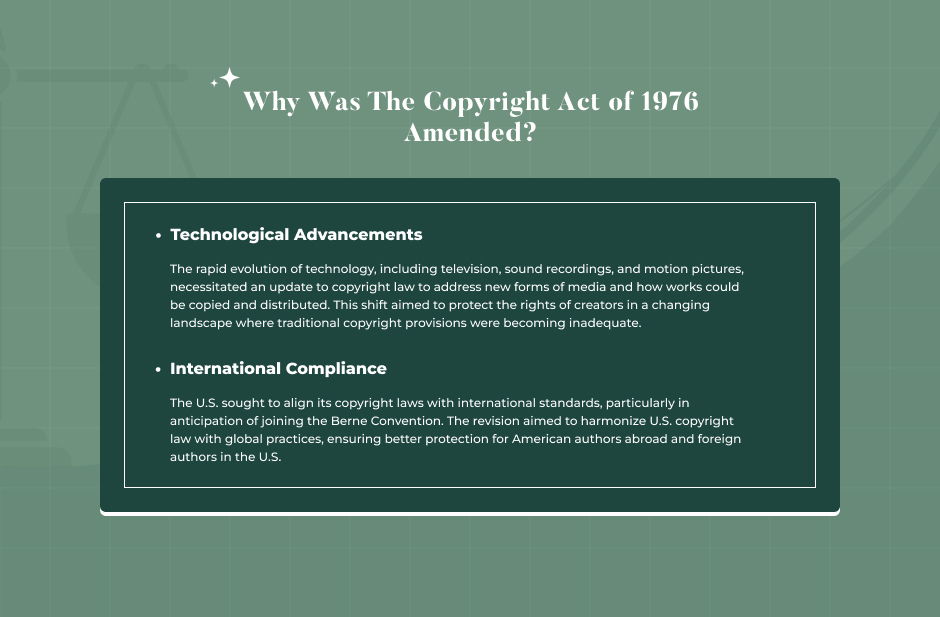“An original writer is not one who imitates nobody, but one whom nobody can imitate.” This is what François-René de Chateaubriand said once. And I feel this holds when discussing the Copyright Act of 1976!
A provision that prevents imitating your original work- an interesting concept, isn’t it? Well, that’s exactly what this act is all about.
The Copyright Act of 1976 came into effect on January 1, 1978. For those of you who are not very aware of it, it serves as the pioneer and foundation of Copyright Law in the United States, protecting works of original authorship.
Additionally, there have been several major changes ever since it came into effect. For instance, it has:
- Spelled out the elementary rights of copyright holders
- Introduced and codified the policy of “fair use”
- Introduced a new concept to the “term of copyright”
But is that all? Nope! Let me explain this act in detail so that you won’t feel confused later on.
Copyright Act of 1976: A Brief History Of The Act

The last recorded update to the US Copyright laws was in 1909. The intellectual property sphere has made considerable progress since then.
Apart from literary works, motion pictures, radio, television, and sound recordings were now in the picture.
The US participation in the Universal Copyright Convention (UCC), held in Geneva, was a turning point. Gradually, the Register of Copyrights in the US began formulating the current Act.
A plethora of Congress-commissioned studies were conducted, which led to the publication of a detailed report(1961) on the revisions of the currently existing copyright laws.
The bill was then introduced in both houses of Congress and the Senate. The approved version was finally introduced under Title 17 of the United States Code.
The law, enacted in 1978, was considered a fair compromise between the author’s and the creator’s sides.
| HISTORICAL CONTEXT OF THE COPYRIGHT ACTS OF 1976 The Act was designed to modernize copyright laws that were outdated due to technological advancements since the Copyright Act of 1909. It aimed to address issues arising from new media forms like television and digital content distribution. |
Purpose and Flagbearers of the Act
Before 1976, there was no specific Act to understand the statutory copyright law in the US. Congress created this Act as a future safeguard against any form of copyright infringement.
The 1970s were a peak decade for technological advancements. Whether it was television or motion pictures, copyright issues in this particular aspect couldn’t be covered by the Act of 1909.
In addition, Barbara Ringer, who coined the overall Copyright Act of 1976, actively took up the role of drafting the new copyright act.
After coining the Copyright Act of 1976, Barbara Ringer became the US Registrar of Copyrights in 1973. She even started advocating for the author’s rights with new technological advances.
The UCC also played a major role in forming this Act. The UCC’s active participation was recognized even in the Berne Convention.
The US later became a party to the UCC in 1955. Here, Congress passed Public Law 743 to adhere to the conventions’ standards.

What are Termination Rights in Copyright?
This Act codified the requirement that writers and other artists properly license their works. If not, they can face termination. The main purpose of adding this part to the Act is to renegotiate licenses later to leverage the original works’ value.
Even if it was not apparent during creation, this renegotiation of the license will help evaluate the work’s worth.
The termination clause became effective in 1978 and does not apply to other works in the hire. Your attorney must create a notice at least two years before the 35-year date given. This gives the holder the right to prepare properly.
Impact of Termination Rights in Copyright
Even though the termination right in copyright came into being in 1978, it finally started getting implemented in 2013. This created a notable media sensation when Victor Willis wrote a song on terminating rights for The Village People.
This, in turn, led to a notable lawsuit called Scorpio Music v. Wills. In this case, the court upheld Willis’s termination rights.
In this case, the songwriters also started seeking termination rights. This event impacted the film industry as well, which became extremely prevalent during the start of the 1980s.
Difference Between the Copyright Act of 1909 and the Copyright Act of 1976

While it is true that I am talking about the Copyright Act of 1976, let me tell you how things changed since the first copyright law was passed in 1909. Here, take a look at the differences:
| Parameter | Copyright Act of 1909 | Copyright Act of 1976 |
|---|---|---|
| Duration of Copyright | Lasted for 28 years with the possibility of renewal for an additional 28 years, totaling a maximum of 56 years. | Extended the duration to the life of the author plus 50 years (later amended to plus 70 years), or 95 years for works made for hire. |
| Scope of Protection | limited to published works and required a copyright notice; unpublished works were governed by state law. | Broadened protection to include all original works fixed in a tangible medium, regardless of publication status, eliminating the need for a copyright notice for protection. |
| Fair Use Doctrine | Did not explicitly recognize fair use; users had to seek permission for most uses | Codified the fair use doctrine, allowing limited use of copyrighted material without permission under certain conditions |
| Formalities | Required formalities such as registration and copyright notice for protection. | Reduced reliance on formalities, allowing automatic protection upon creation without registration. |
| Subject Matter | Defined “writings of an author” but did not explicitly cover emerging media forms. | Expanded the definition to “original works of authorship,” explicitly including categories like audiovisual works and choreography. |
Copyright Act of 1976: Provisions Of Significance
| THINGS TO KNOW ABOUT THE COPYRIGHT ACT OF 1976 • Fair Use Doctrine: The Act codified the “fair use” doctrine, allowing limited use of copyrighted material without permission for purposes like education and criticism, provided it doesn’t harm the work’s market value. • Subject Matter: Copyright protection covers many original works, including literary, musical, dramatic, and audiovisual works. This broad definition was intended to adapt to future technological developments. • Implications for Creators: The Act significantly impacts how creators manage their rights and how their works are used in various industries, emphasizing the importance of understanding these legal protections in today’s digital landscape. |
So, what does the Federal Copyright Act of 1976 specify?
The law declares any previously existing laws on Copyright in the United States to be null and void if they directly violate the provisions of this Act. The most commonly applicable sections include the following:
Section 102: Subject Matter Of The Act
This section defines the areas of creation to which the Act is applicable. It states that the work should be:
- An original work of authorship
- Recorded in a tangible means of expression.
The term “works of authorship” is defined to include the following:
1. Literary Works: Literary work may include dissertations, textbooks, poems, novels, catalogs, magazines, etc. Some of the popular infringement cases include
- Warner Bros. v. RDR Books( Harry Potter Universe)
- Dr. Suess Enterprises v. Penguin Books USA(The Cat is Not in The Hat)
2. Music Works(And Accompanying Words): There is a copyright to the composition and sound recording. Lyrics that are not self-published fall under composition copyright. Some of the most popular music copyright infringement cases include
- Dua Lipa v. Artikal Sound System( Soundtrack: Levitating)
- BTS & Big Hit Entertainment (HYBE) v. Bryan Kahn
3. Dramatic Works(And Accompanying Music): The purview of dramatic works may include but is not limited to
- operas,
- ballets,
- screenplays, and plays.
4. Choreographic Works And Pantomimes: These also fall under the purview of dramatic works.
5. Graphic, Pictorial, And Sculptural Works: These need to possess some degree of creative authorship.
6. Motion Pictures: These include camera, sound, and dialogue. Some important cases include
- Paramount Pictures v. Carol Publishing
- Anderson v. Stallone(Rocky IV)
7. Audio-Visual Works: These include artistic performances, including film soundtracks.
8. Sound Recordings: This right protects against bootlegging and unauthorized sale and dealings of soundtracks.
Section 106: Exclusive Rights
The Copyright Act of 1976 establishes a list of exclusive rights copyright holders can enjoy. They are as follows:
- The Exclusive Right To Reproduce: The first owner of the copyright, the author has every right to reproduce their original work, be it copies or covers.
- The Right To Create Derivative Works: The author can create content derived from his original copyrighted work.
- Right To Distribute Copies And Phonorecords Of The Original Work To The Public By Sale, Lease, Or Renting Out: This right also allows the copywriter to prohibit unauthorized distribution of their work.
- The Right To Perform The Copyrighted Work Publicly: This is applicable in the case of literary, choreographic, motion picture, pantomime, musical, dramatic, or audiovisual work.
- The Right To Display The Work Publicly: This is also applicable in the case of literary, choreographic, motion picture, pantomime, musical, dramatic, or audiovisual work.
Section 107 Of The Copyright Act 1976: Fair Use
This is one of the major defenses to copyright infringement claims. Even if the action technically falls under the purview of Section 106, this Section states that fair use does not constitute copyright infringement.
This Section is specifically applicable to the following areas, although not limited to it:
- News reporting.
- Scholarship.
- Teaching.
- Research purposes.
- Criticisms.
Section 302: Term Of Protection Of Copyright
This Section states that copyright extends to “a term consisting of the author’s life and fifty years after the author’s death.”
For anonymous works, pseudonyms, and works made for hire(done as part of the job), the protection period extends to 75 years.
The Copyright Term Extension Act was passed in 1998, extending the copyright term to the author’s lifespan and 70 more years: 95 years from the date of publication or 120 years from the date of creation for works made for hire.
Section 204: Transfer Of Copyright
This Section elaborates on the transfer of ownership of copyrights. For the successful transfer of copyrights, verbal consent is not enough.
The owner has to sign a statement to that effect. In case of the copyright transfer of a single existing copy, the owner signs away the entirety of his copyrights.
Section 408: Registration Of Copyright
This Section states that registering one’s intellectual property is not a prerequisite for owning the copyright. Although, if one has to take action against infringement, registration is necessary.
Additionally, you need to submit a couple of copies of the work to the office when published for it to be registered under the owner.
Section 203: Termination Of Rights
This Section states that the copyright ceases to exist 35 years after it was granted for licensed works.
First, a notice must be issued to the grantee 2 years before the end of 35 years stating the termination in writing. The author must sign it. This section does not apply to works on hire.
The Copyright Royalty Board
The provisions of the Copyright Royalty Board are dealt with under
- Copyright Royalty and Distribution Reform Act of 2004.
- Copyright Royalty Judges Program Technical Corrections Act.
The Copyright Royal Judges look after minimizing disruptions to the institutions benefiting from the Copyright Laws of the USA.
Your Legal Guide to Copyright Laws
The Copyright Laws of the United States are not exhaustive, and new additions have been made to reflect society’s changing times and requirements.
It has also made considerable progress in cyber law, protecting the works of creators and specialists from infringements.
The fair usage policy has brought about revolutionary changes to the previously staunch and inflexible copyright provisions.
Stay tuned to learn more about upcoming amendments and regulations!
Read Also:
















